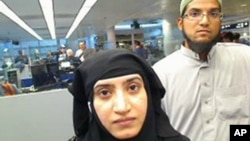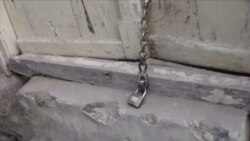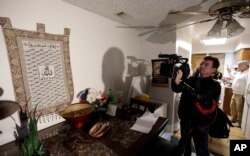The door to Tashfeen Malik's former family home in her ancestral city in the southern Punjab region of Pakistan is padlocked.
The latest family to live here left a few weeks ago, a timely departure given the degree of media interest in the house after last week's San Bernardino, California, attack that authorities say was carried out by Malik and her husband, U.S.-born Syed Rizwan Farook.
Residents and former neighbors told a VOA team that visited the village this week the same things that are so often said about an unsuspecting family that becomes a target.
"They were very good people," Mohammad Hammad said. "I cannot even think that this could happen."
Hammad fears the city's newfound notoriety will bring it shame.
"The people are very unhappy that their city's name has been associated with this," he said.
But whatever it was that radicalized Malik to the point of helping her husband kill 14 people at a holiday party in California is not thought to have come from the time she lived here.
While the FBI says both Malik and her husband had been radicalized long before the attack, Malik only lived in this city until 1989, when she was about three years old.
VOA video: See the city where Tashfeen Malik lived as a small child
At that point, her engineer father, Gulzar Malik, left the region after a family dispute over land and business, locals said.
"He had moved to Jeddah," according to a local journalist, Mohammad Junaid.
Growing up in Saudi Arabia
The roots of Malik's radicalization may be found in Saudi Arabia. It was there that her father pushed the family from the more mystical Sufi form of Islam to a stricter course of Wahhabism, the Sunni Islam branch that is the backbone of Saudi life, Malik's father's brother told VOA.
Family members who traveled to Saudi Arabia found that Gulzar Malik was strictly religious, and his family deeply devout.
The family rarely returned to Pakistan, but kept the family house in southern Punjab province.
One of Malik's cousins, Malik Ahmad Ali Oulak, was a provincial minister in the ruling Pakistan Muslim League government.
Southern Punjab is known as a hub for local extremist groups, including a number of militant groups that support terrorist activities in many parts of the country, as well as terrorist groups in Afghanistan.
‘What happened to Malik?’
In 2007, Malik returned to Pakistan without her family to study for a pharmacy degree at Bahauddin Zakarita University in Multan, about 160 kilometers from here.
Multan — and Malik’s hometown — were cauldrons for sectarian violence at that time, as Pakistan was under repeated attack by the Taliban.
Malik did not take well to campus life, her family told VOA. She wore a niqab, which covered her completely except for her eyes, and hated living in a hostel with other women.
"I would call Tashfeen a Saudi girl," Dr. Syed Nisar Hussain Shah told the New York Times, making a distinction with her Pakistani roommates.
Malik later moved into a house her parents rented for her.
"We were like, ‘What happened to Malik?’ " Abida Rani, one of her few friends, told the Washington Post. "She became so religious, so serious and so focused on Islamic teachings, and she lost her interest in her studies."
In 2013, Malik got her pharmacy degree and, about that same time, she enrolled in the Al-Huda Institute — a women-only madrassa with branches in the U.S. and Canada. Al-Huda Institute has no known links to extremists.
At Al-Huda, Malik enrolled in a two-year course to study the Quran. But she did not complete it.
"She took her last paper [test] on May 3, 2014," Al-Huda's spokesperson, Farrukh Chaudhry told VOA.
Malik told the institute that "she was going to get married in two months, after which she will settle in the U.S. and will do the remaining course through correspondence [distance learning]," said Chaudhry, who condemned the San Bernardino attack.
Three months after that last test, Malik married Syed Rizwan Farook in Riverside, California.








